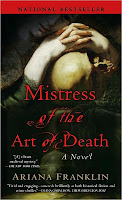 I’m thrilled today to welcome Colleen Gleason to the Riskies. Colleen is known for her Gardella vampire series, about a Regency vampire hunter and she also leads a double life as Joss Ware, author of the Envy Chronicles, post-apocalyptic urban romances (try saying that with a mouthful of popcorn). But now she’s back to the Regency with a whole new world of vampires who mingle with the haute ton in 19th century London. Called the Draculia, these vampires are strong and sexy, and a match for any mortal…except for the women who love them.
I’m thrilled today to welcome Colleen Gleason to the Riskies. Colleen is known for her Gardella vampire series, about a Regency vampire hunter and she also leads a double life as Joss Ware, author of the Envy Chronicles, post-apocalyptic urban romances (try saying that with a mouthful of popcorn). But now she’s back to the Regency with a whole new world of vampires who mingle with the haute ton in 19th century London. Called the Draculia, these vampires are strong and sexy, and a match for any mortal…except for the women who love them.
 The first in the series is The Vampire Voss and Colleen is giving away a signed copy to one lucky winner who comments or asks her a question today! (And happy St. Pat’s. Note the green questions.)
The first in the series is The Vampire Voss and Colleen is giving away a signed copy to one lucky winner who comments or asks her a question today! (And happy St. Pat’s. Note the green questions.)
Welcome Colleen! How are these vampires different from the vamps in your Gardella books?
Because I wanted to write vampire romance novels this time around, meaning I wanted there to be a romance with the vampires, the mythology had to be different. In the Gardellas, there are no good vampires. None of them are dukes or viscounts or even heroic at all—so I had to think about the mythology and come up with a way to make it different from the Gardellas, yet not to completely destroy the world I created with them as well.
In this series, the vampires are part of a secret society that is beholden to Lucifer. Each member of the Draculia has sold his or her soul to the devil at some point, and now they are living an immortal life with everything they could ever want: pleasure, money, power, and all without the fear of death.
Each book is about one vampire in particular who falls in love, and, in this context, realizes that his/her soul belongs to Lucifer and is no longer their own.
But–as I’m sure the Regency fans out there will appreciate–along with the vampire aspect, readers can expect everything else we love about the Regency-era: balls and masquerades, the haute ton, titled bad boys and brooding earls.
What was your original inspiration?
My publisher was interested in me trying my hand at sexy vampires in a Regency setting. So, that was the kernel of my inspiration.
And then I had to think about how I could have both good and bad vampires…and then I had to think about the overall issue of an immortal falling in love with a mortal and the ways in which that might be resolved.
Why do you think the Regency works as a supernatural setting?
Oooh….I think for me it has to do with the coaches and carriages, the balls and masques…and of course, foggy, mysterious London. All of those aspects can give the era a sense of the mysterious and of intrigue. Plus the fact that Society at that time really lived late in the day and well into the night—a perfect setting for an immortal who can’t go out into the sunlight!
Of the three Draculia books, which is your favorite hero? Why?
 I think Dimitri (April, 2011) is my favorite hero, only because I love, love, love the brooding, grumpy, closed-off hero who meets his match.
I think Dimitri (April, 2011) is my favorite hero, only because I love, love, love the brooding, grumpy, closed-off hero who meets his match.
But I adore Voss too, for he is just so fun…until he realizes that things aren’t just fun and games. He has a rude awakening.
You must have been writing your Joss Ware books at the same time as these. How did you switch mentally between the two very different series?
I love being able to switch between two series, two time frames. It helps keep me from being bored, and it also forces me to think about things in each series from the perspective of the other. I might be writing in one series, but something will spur me to think about the other series. It helps me to become more well-rounded in the series.
Do you like to listen to music while you write? What did you listen to for these books?
I love to listen to instrumental music when I write, or things that are chantlike. That way I can get into the feel of the music, but there aren’t any words to distract me.
I listen to soundtracks a lot when I work—particularly Harry Potter and also some meditative music.
 Here’s book #3 The Vampire Narcise (May, 2011). Don’t you love that she’s on top?! What do you think of vampires in the Regency? Here’s your chance to pick Colleen’s brain about (zombies, sorry), vamps, vampire-hunters and the evil–or otherwise–that lurks in the depths of foggy London.
Here’s book #3 The Vampire Narcise (May, 2011). Don’t you love that she’s on top?! What do you think of vampires in the Regency? Here’s your chance to pick Colleen’s brain about (zombies, sorry), vamps, vampire-hunters and the evil–or otherwise–that lurks in the depths of foggy London.









